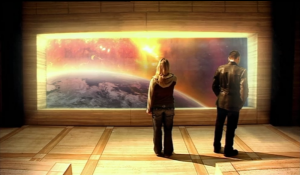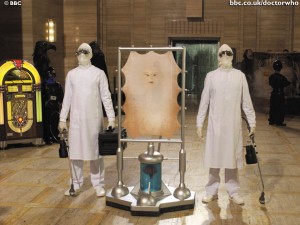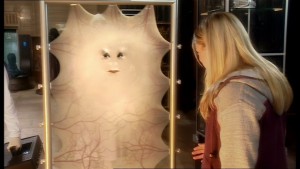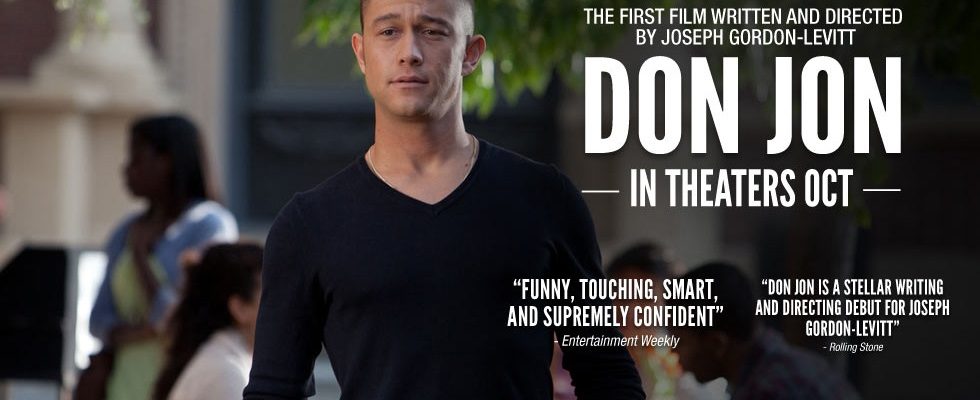The second episode of the Doctor Who reboot is ominously and aptly named: “The End of the World.” It is indeed the end of the world as Rose knows it. She has (1) dared to believe in the unseen and (2) leapt, and now she suddenly finds herself in the middle of the unbelievably, utterly alien.
The first hint of doubt, perhaps even panic, enters here. “I sorta hitched a lift with this man. I didn’t really think about it. He’s a complete stranger.” As she says the words, she seems to realize the truth of them for the first time.

Not only is she overwhelmed by this initial experience of traveling in time and space, but the Doctor (perhaps an insensitive choice) brings her to a space station where they will watch the passing of planet Earth as it is consumed by the expanding sun. As they wait for it to occur with wealthy guests who have paid handsomely to witness the event, Rose struggles with the fact that she is not only worlds away from those she loves, but for all intents and purposes, they are dead. In seconds, she has leapt forward in time and skipped over the passing of everything she has known and loved.
Death is an overwhelming theme in this episode, as we witness how its reality informs the actions of several characters–most obviously the Doctor and a “woman” named Cassandra who calls herself “the last human.”
Cassandra, a face on a stretched-out piece of skin, was presumably once human…before all the plastic surgery. She has endured long past her “time” to die. Her only priority seems to be evading her end by scientific and surgical preservation. She is our episode’s villain–she plans to disable the space station’s shields and teleport off just as everyone on board is incinerated, in some way financially profiting from the disaster. When the crisis is averted and she is discovered, the Doctor observes: “5 billion years, and it still comes down to money.” But it’s more than just about money: it is to continue to fund her way of “life.” The Doctor is angry: despite his intervention, “people have died” as a result of Cassandra’s selfish scheme. She responds to his rebuke without hesitation, saying: “It depends on what you mean by people.” Her life is so consumed by self that there is no longer room to consider anyone else. We see here that for all her striving to cheat death, she has not truly evaded it after all. “You’re not human,” Rose says to her, “you’ve had it all nipped and tucked…anything human got chucked in the bin.” Not only is her continued existence not adding anything positive to the world but in a sense, her one pervading passion–to survive–as killed anything else within her.
T he Doctor is in many ways the antithesis of Cassandra. The shields of the space station inexplicably begin to fall and at this first sign of trouble, he says “That’s not supposed to happen” and smiles widely at the thought. “If we get in trouble, there’s no one on board to help?” He asks one of the guests, a tree named Jabe. “Fantastic.” The tree looks at him quizzically. “In what way is that fantastic?” She asks. The Doctor is right at home in this sort of scenario. He is used to the dangerous, the harrowing, because he has made a life of chasing down trouble. In a sense, he is running towards death. Why? The Doctor is full of secrets that he does not readily relinquish. At the beginning of the episode, Rose is exasperated that he will not answer her inquiries about his origin, his people. We are allowed our first glimpse into the mystery of the Doctor when Jabe discovers that he is the last of a species made extinct by a devastating war. She tenderly observes: “Perhaps a man only enjoys trouble when there’s nothing left.” The Doctor’s expression shows that she has hit a mark. The only one of his kind left, is he chasing down danger, running towards his end so that he might re-join those he loves? Whatever his motivations, his life–lived broadly, courageously, rashly–actually sows good into the world. Rather than self-preserving, he puts himself in danger to save the lives of others.
he Doctor is in many ways the antithesis of Cassandra. The shields of the space station inexplicably begin to fall and at this first sign of trouble, he says “That’s not supposed to happen” and smiles widely at the thought. “If we get in trouble, there’s no one on board to help?” He asks one of the guests, a tree named Jabe. “Fantastic.” The tree looks at him quizzically. “In what way is that fantastic?” She asks. The Doctor is right at home in this sort of scenario. He is used to the dangerous, the harrowing, because he has made a life of chasing down trouble. In a sense, he is running towards death. Why? The Doctor is full of secrets that he does not readily relinquish. At the beginning of the episode, Rose is exasperated that he will not answer her inquiries about his origin, his people. We are allowed our first glimpse into the mystery of the Doctor when Jabe discovers that he is the last of a species made extinct by a devastating war. She tenderly observes: “Perhaps a man only enjoys trouble when there’s nothing left.” The Doctor’s expression shows that she has hit a mark. The only one of his kind left, is he chasing down danger, running towards his end so that he might re-join those he loves? Whatever his motivations, his life–lived broadly, courageously, rashly–actually sows good into the world. Rather than self-preserving, he puts himself in danger to save the lives of others.
Our villain is brought back at the end of the episode for a final confrontation. It turns out that this talking piece of skin, stretched and secured to a frame, this “human,” devoid of any care or compassion for anyone else, ironically needs others in order to survive. She cannot move of her own accord, and most importantly, she constantly needs to be moisturized. Without her aides to do so, she begins to shrivel and dry up, eventually meeting her demise by exploding into little fragments. The Doctor does not intervene as this happens. With gravity and sadness in his voice, he remarks: “Everything has its time, and everything dies.” Perhaps he has in mind his planet, Gallifrey; his entire species, the Time Lords. Perhaps he has himself in mind as well.
Though we can only assume from observation what Cassandra and the Doctor believe about life after death, the wide contrast of their responses to death presents the interesting question: How do beliefs about death inform the choices of the living?
The Christian perspective says that not only is there something right and beautiful and whole awaiting us after life, but that there is an importance and connection to what we experience on Earth. After all, Heaven will be a new Earth–transformed, not abandoned. The cornerstone of this Gospel is Jesus Christ. In the Bible, from the multiple perspectives of Matthew 26, John 13, and Luke 22, we bear witness to his beliefs about death and his life’s response to them. He knows the death that he travels towards, and though it is a horrifying end (he asks God the Father to deliver him!), he does not run away from it; He takes the part of a servant, washing the feet of his disciples, even those of a man who betrays him, and he urges them to love others, teaching the ultimate importance of using our lives to sow good into the world and each other; His resurrection proves that not even death is lethal, and so no adventure is too dangerous for us to embark on: there is no need for self-preservation to be the highest priority.
And what does Rose believe? Of all the characters in the series, she most closely resembles the perspective of the viewer. This episode marks the end of her world as she knows it, and she is overwhelmed by all that it conjures within her. Whether or not she is conscious of it, she assumes the role of child, apprentice, observer, watching these different responses to death unfold: one compelling someone love and help others, and the other causing someone to be selfish and self-preserving above all else. At the end of the episode, though we may begin to infer based on her obvious disgust of Cassandra and her decision to continue traveling with the Doctor, it is not made explicit where Rose lands on the issue. Ultimately, it will be the culminated story of her life that reveals her stance–the choices that she makes every day in the face of fear and hardship. Especially at the Doctor’s side, she will find plenty of such opportunities.
“When we look at the whole scope of this story line, we see clearly that Christianity is not only about getting one’s individual sins forgiven so we can go to heaven. That is an important means of God’s salvation, but not the final end or purpose of it. The purpose of Jesus’s coming is to put the whole world right, to renew and restore the creation, not to escape it. It is not just to bring personal forgiveness and peace, but also justice and shalom to the world. God created both the body and soul, and the resurrection of Jesus shows that he is going to redeem both body and soul. The work of the Spirit of God is not only to save souls but also to care and cultivate the face of the earth, the material world.” -Timothy J. Keller, The Reason for God: Belief in an Age of Skepticism.



